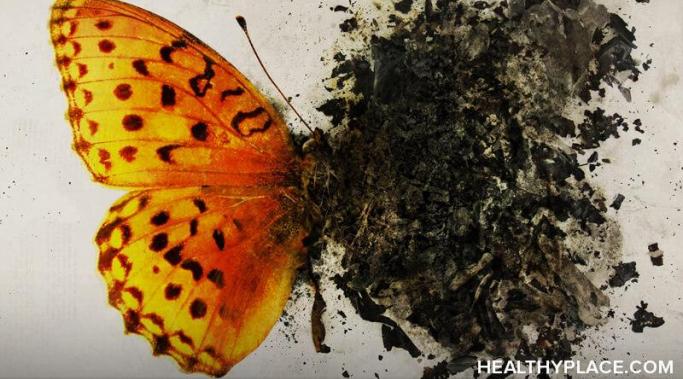Blogs
Shame can keep you trapped in an eating disorder. Shame is insidious, creeping into our self-esteem and wreaking havoc on our thoughts and feelings. Eating disorders come with both shame and guilt, but the difference is important. Shame is the feeling that “I am bad,” while guilt is the feeling that, “I did something bad.” The insidious part about shame is that we begin to see ourselves and the eating disorder as one. When we do this, we become all bad and shame keeps us trapped in the eating disorder.
I am suffering through a long bout of bipolar medication side effects. Side effects, withdrawal effects, call them what you like, they are caused by the use of medication. And I am white-knuckling it. I know that, in my case, there are no options better than this very sucky one. But I tell you, I hate suffering through bipolar medication side effects.
Relationships with schizophrenia are complicated. When I was diagnosed with schizophrenia, a lot of things suddenly made sense and a lot of things were instantly out of place. For instance, my relationship with friends and family got complicated. As first, I didn't know if I should tell them. I was afraid of how they might react. The same was true for meeting new people. When do I tell them? Should I tell them? What if I scare them away? The word "schizophrenia" carries a stigma after all. Stacked on top of this was the fact that I have always been more of an introvert by nature. Being told I was schizophrenic didn't help. Instead, it became a justification for me to withdraw and refrain from being social. My relationships have been altered by my schizophrenia.
It's hard to find love, and dating with depression feels impossible sometimes. Dating with depression comes with unique struggles in addition to the usual ones. I've struggled with identifying bad relationships, asking the right questions, and so much more (Depression Makes Social Interaction Stressful). Thankfully, recent realizations have provided relief, so I'm hopeful that dating with depression will improve.
How can you recognize verbal abuse disguised as a joke? Here's the thing: a loving partner will never call you ugly or stupid, even as a joke. A respectful husband or wife won't ever deliberately put you down in front of other people for a laugh. That's because it's not funny, it's verbal abuse thinly disguised as a joke.
There is a stigma against parents who raise a child with mental illness. I felt this stigma against parents myself as I sat in my first National Alliance on Mental Illness (NAMI) meeting, horror slowly crept up my body like a spider crawling across my skin. The organization provides education and support for both people suffering from mental illness and their families. I was attending a meeting for families but as I listened to one story after another, I was sure I didn't belong (Stigma of Being Branded Bad Parents). But this was the stigma against parents who raise a child with mental illness rearing its ugly head.
My memories lost to dissociation come from having experienced prolonged traumatic abuses as a child. I developed the protective reflex of dissociation at an early age. Dissociation was my response to frightening, harmful, and unpredictable environments. I learned to tune out and shut down mentally while still being able to respond to my surroundings to function in the moment. I don't know this because I remember it. I know this because other people hold memories for me. Here is how I began reclaiming my memories lost to trauma-related dissociation.
A post made by a woman named Madelyn Parker about the response from the Chief Executive Officer (CEO) of the company she works for after she said she was taking mental health sick days has gone viral. The compassion and understanding of web developing company CEO Ben Congleton toward Parker taking time for her mental health has drawn a wealth of virtual applause and admiration. There are, however, naysayers taking issue with the post, and one response, in particular, I’ve seen is riddled with stigma around taking mental health sick days from work.
Many people with mental illness have their reasons to self-injure but it's important to resist self-harm urges. While most commonly associated with borderline personality disorder (BPD), self-harm can occur with any mental illness. There are three reasons people self-injure: to punish themselves, to feel something instead of nothing, and to feel stronger.









